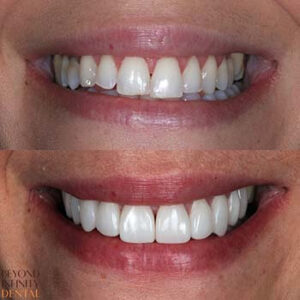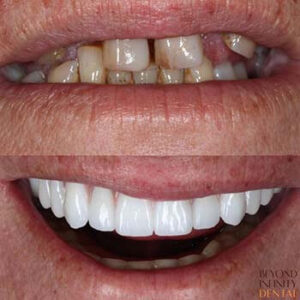What do teeth really look like under veneers? There is so much more than meets the eye. If you are looking to get dental veneers, here is a quick guide to anything and everything you absolutely need to know!
What are veneers?
Before answering the question, what do teeth look like under veneers? we need to explain what they are.
Veneers are customised, wafer-thin shells made of tooth-coloured materials designed to cover the tooth’s front surface. Dentists use them to correct cosmetic issues with the smile by enhancing the look, colour, shape, size, and length of the teeth. Dental veneers are arguably one of the most popular cosmetic dentistry procedures because of how they can elevate anyone’s appearance!
At Beyond Infinity Dental, we offer porcelain veneers and composite veneers. Each treatment has its own advantages and disadvantages, which we will discuss further!
What problems do veneers fix?
 Whether you opt for porcelain or composite veneers, this procedure is used to change the appearance of teeth that are:
Whether you opt for porcelain or composite veneers, this procedure is used to change the appearance of teeth that are:
- discoloured or heavily stained
- worn-down
- gapped
- broken or chipped
- irregularly shaped
- uneven
Veneers are also recommended to those who just want a fresh, new look! So if you are unsatisfied with your smile and you want to take your confidence up a notch, go for veneers!
Porcelain veneers and their benefits
Porcelain veneers are all the rage nowadays because they look incredibly lifelike and natural. This high-quality material is chosen for its translucent properties that enable light to partially pass through the material similarly to tooth enamel. Without this translucency, the result wouldn’t be half as good.
Aside from this, porcelain veneers are also known for their durability. In fact, they have proven to last for up to 20 years. But this is, of course, with proper upkeep, such as maintaining good oral hygiene. Porcelain veneers should also not be subjected to direct force as they will likely chip. Other than that, they can give you a beautiful smile for a very long time!
The major downside to porcelain veneers is their inflexibility to damage. When one cracks or breaks, it has to be replaced by the laboratory that made them. They are also more expensive compared to their composite alternative.
Composite Veneers
If you are looking for a quick fix, you might want to consider composite veneers. Composite is tooth-coloured material made with synthetic resins. Patients love them because they can be completed in a single dental visit. So you can enter our clinic, get the treatment done, and leave with a new smile the same day! With proper care, you can expect your composite veneers to last you up to 7 years!
However, composite veneers are inferior to porcelain in strength and aesthetics. Composite is weaker, so your veneers may chip more easily and need repairs more frequently. This can be less practical in the long run. Also, composite veneers do not have translucent properties so they don’t look quite as natural.
Now onto the more pressing question, what do teeth look like under veneers?
In the case of composite veneers, very little tooth preparation is required. The resin is applied to the tooth’s surface and shaped and moulded by the dentist. It is then cured with a high-density light, and voila, your chipped or discoloured tooth looks brand new.
So, in answer to what do teeth look like under veneers?
When composite veneers are removed by the dentist, the teeth look the same as they did before.
However, that’s not the case with porcelain veneers. To accommodate this type of veneer so that it sits flush within the smile, a dentist needs to remove a thin layer of tooth enamel, which can cause tooth sensitivity.
 Because tooth enamel cannot regenerate itself, it means that, unlike composite veneers, porcelain veneers cannot be reversed. Once a person has them, there is no going back; In other words, they are permanent.
Because tooth enamel cannot regenerate itself, it means that, unlike composite veneers, porcelain veneers cannot be reversed. Once a person has them, there is no going back; In other words, they are permanent.
At Beyond Infinity Dental, we keep the reduction of your tooth enamel to a minimum. Conserving your natural teeth is our priority to ensure a longer-lasting veneer smile! Because as they say, less is more.
So, what do teeth look like under veneers? Well, they possibly look a little strange with the enamel removed, but since they will be permanently covered with veneers, no one is going to see them anyway!
This is the beauty of veneers. They completely mask your teeth underneath so you can have a brand new, more beautiful smile!
Do teeth under veneers rot?
We always emphasise the importance of taking care of your oral health because this rewards you with many benefits. Practising good oral hygiene habits and visiting your dentist every six months are ways to prevent damage to the teeth underneath the veneers. Not doing so results in their eventual breakage, and you may find the teeth under them have already decayed.
How do I take care of my veneers?
Treat them as if they are your natural teeth! Regularly brush and floss them, and gargle with mouthwash to keep them sparkly. While veneers cover the front of your teeth, the back part is still exposed to bacteria causing cavities. So if you are not strict with your oral care practices, you can expect your veneers to fail quickly.
So now you have the answer to what do teeth look like under veneers, are you ready to achieve your dream smile.
Want to improve the look of your smile?
At Beyond Infinity Dental, you can trust us to bring out the best in your smile. Our cosmetic dentists will determine if you are a suitable candidate and explain the procedure, so you know what to expect. Contact us today at (02) 8806 3799 to schedule an appointment.









